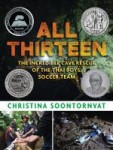
All Thirteen: The Incredible Cave Rescue of the Thai Boys’ Soccer Team
By: Christina SoontornvatOn June 23, 2018, twelve young players of the Wild Boars soccer team and their coach enter a cave in northern Thailand seeking an afternoon's adventure. But when they turn to leave, rising floodwaters block their path out. The boys are trapped! Before long, news of the missing team spreads, launching a seventeen-day rescue operation involving thousands of rescuers from around the globe. As the world sits vigil, people begin to wonder: how long can a group of ordinary kids survive in complete darkness, with no food or clean water? Luckily, the Wild Boars are a very extraordinary "ordinary" group. Combining firsthand interviews of rescue workers with in-depth science and details of the region's culture and religion, author Christina Soontornvat--who was visiting family in Northern Thailand when the Wild Boars went missing--masterfully shows how both the complex engineering operation above ground and the mental struggles of the thirteen young people below proved critical in the life-or-death mission. Meticulously researched and generously illustrated with photographs, this page-turner includes an author's note describing her experience meeting the team, detailed source notes, and a bibliography to fully immerse readers in the most ambitious cave rescue in history.
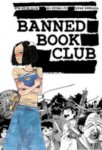
By: Hyun Sook Kim
When Kim Hyun Sook started college in 1983 she was ready for her world to open up. After acing her exams and sort-of convincing her traditional mother that it was a good idea for a woman to go to college, she looked forward to soaking up the ideas of Western Literature far from the drudgery she was promised at her family’s restaurant. But literature class would prove to be just the start of a massive turning point, still focused on reading but with life-or-death stakes she never could have imagined.
This was during South Korea's Fifth Republic, a military regime that entrenched its power through censorship, torture, and the murder of protestors. In this charged political climate, with Molotov cocktails flying and fellow students disappearing for hours and returning with bruises, Hyun Sook sought refuge in the comfort of books. When the handsome young editor of the school newspaper invited her to his reading group, she expected to pop into the cafeteria to talk about Moby Dick, Hamlet, and The Scarlet Letter. Instead she found herself hiding in a basement as the youngest member of an underground banned book club. And as Hyun Sook soon discovered, in a totalitarian regime, the delights of discovering great works of illicit literature are quickly overshadowed by fear and violence as the walls close in.
In BANNED BOOK CLUB, Hyun Sook shares a dramatic true story of political division, fear-mongering, anti-intellectualism, the death of democratic institutions, and the relentless rebellion of reading.

Can’t Stop, Won’t Stop: A Hip-Hop History
By: Jeff ChangThe American Book Award winner, now completely adapted for a young adult audience!
From award-winning author Jeff Chang, Can't Stop Won't Stop is the story of hip-hop, a generation-defining movement and the music that transformed American politics and culture forever.
Hip hop is one of the most dominant and influential cultures in America, giving new voice to the younger generation. It defines a generation's worldview. Exploring hip hop's beginnings up to the present day, Jeff Chang and Dave "Davey D" Cook provide a provocative look into the new world that the hip hop generation has created.
Based on original interviews with DJs, b-boys, rappers, activists, and gang members, with unforgettable portraits of many of hip hop's forebears, founders, mavericks, and present day icons, this book chronicles the epic events, ideas and the music that marked the hip hop generation's rise.

Disability Visibility: First-Person Stories from the Twenty-First Century
By: Alice WongOne in five people in the United States lives with a disability. Some disabilities are visible, others less apparent—but all are underrepresented in media and popular culture. Now, just in time for the thirtieth anniversary of the Americans with Disabilities Act, activist Alice Wong brings together this urgent, galvanizing collection of contemporary essays by disabled people.
From Harriet McBryde Johnson’s account of her debate with Peter Singer over her own personhood to original pieces by authors like Keah Brown and Haben Girma; from blog posts, manifestos, and eulogies to Congressional testimonies, and beyond: this anthology gives a glimpse into the rich complexity of the disabled experience, highlighting the passions, talents, and everyday lives of this community. It invites readers to question their own understandings. It celebrates and documents disability culture in the now. It looks to the future and the past with hope and love.

How to Change Everything: The Young Human’s Guide to Protecting the Planet and Each Other
By: Naomi KleinWarmer temperatures. Fires in the Amazon. Superstorms. These are just some of the effects of climate change that we are already experiencing.
The good news is that we can all do something about it. A movement is already underway to combat not only the environmental effects of climate change but also to fight for climate justice and make a fair and livable future possible for everyone. And young people are not just part of that movement, they are leading the way. They are showing us that this moment of danger is also a moment of great opportunity—an opportunity to change everything.
Full of empowering stories of young leaders all over the world, this information-packed book from award-winning journalist and one of the foremost voices for climate justice, Naomi Klein, offers young readers a comprehensive look at the state of the climate today and how we got here, while also providing the tools they need to join this fight to protect and reshape the planet they will inherit.

Last Witnesses: An Oral History of the Children of World War II
By: Svetlana AlexievichI finished first grade in May of 41, and my parents took me for the summer to the Pioneer camp. I came there, went for a swim once, and two days later the war began. German planes flew over, and we shouted "Hurray!" We didn't understand that they could be enemy planes. Until they began to bomb us... Then all colours disappeared. All shades.
What did it mean to grow up in the Soviet Union during the Second World War? In the late 1970s, Svetlana Alexievich started interviewing people who had experienced war as children, the generation that survived and had to live with the trauma that would forever change the course of the Russian nation. With remarkable care and empathy, Alexievich gives voice to those whose stories are lost in the official narratives, uncovering a powerful, hidden history of one of the most important events of the twentieth century.
Published to great acclaim in the USSR in 1985 and now available in English for the first time, this masterpiece offers a kaleidoscopic portrait of the human consequences of the war - and an extraordinary chronicle of the Russian soul.
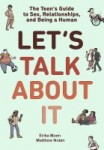
Let’s Talk About It: The Teen’s Guide to Sex, Relationships, and Being a Human
By: Erika MoenAn inclusive, accessible and honest graphic novel guide to growing up, from gender and sexuality to consent and safe sex. Perfect for any teen starting to ask...Is what I'm feeling normal? Is what my body is doing normal? Am I normal? How do I know what are the right choices to make? How do I fix it when I make a mistake?
Let's talk about it.
Growing up is complicated.
How do you find the answers to all the questions you have about yourself, about your identity, and about your body? Let's Talk About It provides a comprehensive, thoughtful, well-researched graphic novel guide to everything you need to know but might not know how to talk about.
Covering relationships, friendships, gender, sexuality, anatomy, body image, safe sex, sexting, jealousy, rejection, sex education, and more, this is the go-to handbook for every teen navigating adolescence, and the first in graphic novel form.
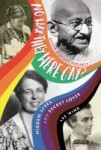
No Way, They were Gay?: Hidden Lives and Secret Loves
By: Lee WindHistory sounds really official. Like it's all fact. Like it's definitely what happened.
But that's not necessarily true. History was crafted by the people who recorded it. And sometimes, those historians were biased against, didn't see, or couldn't even imagine anyone different from themselves.
That means that history has often left out the stories of LGBTQIA+ people: men who loved men, women who loved women, people who loved without regard to gender, and people who lived outside gender boundaries. Historians have even censored the lives and loves of some of the world's most famous people, from William Shakespeare and Pharaoh Hatshepsut to Cary Grant and Eleanor Roosevelt.
Join author Lee Wind for this fascinating journey through primary sources―poetry, memoir, news clippings, and images of ancient artwork―to explore the hidden (and often surprising) Queer lives and loves of two dozen historical figures.

Notes from a Young Black Chef: A Memoir
By: Kwame OnwuachiFood was Kwame Onwuachi's first great love. He connected to cooking via his mother, in the family's modest Bronx apartment. From that spark, he launched his own catering company with twenty thousand dollars he made selling candy on the subway and trained in the kitchens of some of the most acclaimed restaurants in the country. He faced many challenges on the road to success, including breaking free of a dangerous downward spiral due to temptation and easy money, and grappling with just how unwelcoming the world of fine dining can be for people of color.
Born on Long Island and raised in New York City, Nigeria, and Louisiana, Kwame Onwuachi's incredible story is one of survival and ingenuity in the face of adversity.
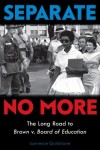
Separate No More: The Long Road to Brown v. Board of Education
By: Lawrence GoldstoneSince 1896, in the landmark outcome of Plessy v. Ferguson, the doctrine of "separate but equal" had been considered acceptable under the United States Constitution. African American and white populations were thus segregated, attending different schools, living in different neighborhoods, and even drinking from different water fountains. However, as African Americans found themselves lacking opportunity and living under the constant menace of mob violence, it was becoming increasingly apparent that segregation was not only unjust, but dangerous.
Fighting to turn the tide against racial oppression, revolutionaries rose up all over America, from Booker T. Washington to W. E. B. Du Bois. They formed coalitions of some of the greatest legal minds and activists, who carefully strategized how to combat the racist judicial system. These efforts would be rewarded in the groundbreaking cases of 1952-1954 known collectively as Brown v. Board of Education of Topeka, in which the US Supreme Court would decide, once and for all, the legality of segregation -- and on which side of history the United States would stand.
In this thrilling examination of the path to Brown v. Board of Education, Constitutional law scholar Lawrence Goldstone highlights the key trials and players in the fight for integration. Written with a deft hand, this story of social justice will remind readers, young and old, of the momentousness of the segregation hearings.
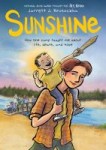
By: Jarrett Krosoczka
When Jarrett J. Krosoczka was in high school, he was part of a program that sent students to be counselors at a camp for seriously ill kids and their families. Going into the camp, Jarrett was worried: Wouldn't it be depressing, to be around kids facing such a serious struggle? Wouldn't it be grim?
But instead of the shadow of death, Jarrett found something else at Camp Sunshine: the hope and determination that gets people through the most troubled of times. Not only was he subject to some of the usual rituals that come with being a camp counselor (wilderness challenges, spooky campfire stories, an extremely stinky mascot costume), but he also got a chance to meet some extraordinary kids facing extraordinary circumstances. He learned about the captivity of illness, for sure . . . but he also learned about the freedom a safe space can bring.
Now, in his follow-up to the National Book Award finalist Hey, Kiddo, Jarrett brings readers back to Camp Sunshine so we can meet the campers and fellow counselors who changed the course of his life.

The Beautiful Struggle: A Memoir
By: Ta-Nehisi CoatesAs a child, Ta-Nehisi Coates was seen by his father, Paul, as too sensitive and lacking focus. Paul Coates was a Vietnam vet who'd been part of the Black Panthers and was dedicated to reading and publishing the history of African civilization. When it came to his sons, he was committed to raising proud Black men equipped to deal with a racist society, during a turbulent period in the collapsing city of Baltimore where they lived.
Coates details with candor the challenges of dealing with his tough-love father, the influence of his mother, and the dynamics of his extended family, including his brother "Big Bill," who was on a very different path than Ta-Nehisi. Coates also tells of his family struggles at school and with girls, making this a timely story to which many readers will relate.

The Cat I Never Named: A True Story of Love, War and Survival
By: Amra Sabic-El-RayessAmra was a teen in Bihac, Bosnia, when her friend said they couldn’t speak anymore because Amra was Muslim. Then refugees from other cities started arriving, fleeing Serbian persecution. When Serbian tanks rolled into Bihac, the life she knew disappeared—right as a stray cat followed her home. Her family didn’t have the money to keep a pet, but after the cat seemed to save her brother, how could they turn it away? Saving a life one time could be a coincidence, but then it happened again—and Amra and her family wondered just what this cat was.
This is the story of a teen who, even in the brutality of war, never wavered in her determination to obtain education, maintain friendships, and even find a first love—and the cat that provided comfort, and maybe even served as a guardian spirit, in the darkest of times.

By: Judy Batalion
Witnesses to the brutal murder of their families and neighbors and the violent destruction of their communities, a cadre of Jewish women in Poland—some still in their teens—helped transform the Jewish youth groups into resistance cells to fight the Nazis. With courage, guile, and nerves of steel, these “ghetto girls” paid off Gestapo guards, hid revolvers in loaves of bread and jars of marmalade, and helped build systems of underground bunkers. They flirted with German soldiers, bribed them with wine, whiskey, and home cooking, used their Aryan looks to seduce them, and shot and killed them. They bombed German train lines and blew up a town’s water supply. They also nursed the sick and taught children.
Yet the exploits of these courageous resistance fighters have remained virtually unknown.
As propulsive and thrilling as Hidden Figures, In the Garden of Beasts, Band of Brothers, and A Train in Winter, The Light of Days at last tells the true story of these incredible women whose courageous yet little-known feats have been eclipsed by time. Judy Batalion—the granddaughter of Polish Holocaust survivors—takes us back to 1939 and introduces us to Renia Kukielka, a weapons smuggler and messenger who risked death traveling across occupied Poland on foot and by train. Joining Renia are other women who served as couriers, armed fighters, intelligence agents, and saboteurs, all who put their lives in mortal danger to carry out their missions. Batalion follows these women through the savage destruction of the ghettos, arrest and internment in Gestapo prisons and concentration camps, and for a lucky few—like Renia, who orchestrated her own audacious escape from a brutal Nazi jail—into the late 20th century and beyond.
Powerful and inspiring, featuring twenty black-and-white photographs, The Light of Days is an unforgettable true tale of war, the fight for freedom, exceptional bravery, female friendship, and survival in the face of staggering odds.

By: George M. Johnson
This is the vibrant story of George, Garrett, Rall, and Rasul -- four children raised by Nanny, their fiercely devoted grandmother. The boys hold one another close through early brushes with racism, memorable experiences at the family barbershop, and first loves and losses. And with Nanny at their center, they are never broken.
George M. Johnson captures the unique experience of growing up as a Black boy in America through rich family stories that explore themes of vulnerability, sacrifice, and culture.
Complete with touching letters from the grandchildren to their beloved matriarch and a full color photo insert, this heartwarming and heartbreaking memoir is destined to become a modern classic of emerging adulthood.
